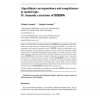Free Online Productivity Tools
i2Speak
i2Symbol
i2OCR
iTex2Img
iWeb2Print
iWeb2Shot
i2Type
iPdf2Split
iPdf2Merge
i2Bopomofo
i2Arabic
i2Style
i2Image
i2PDF
iLatex2Rtf
Sci2ools
105
click to vote
JANCL
2008
2008
Algorithmic correspondence and completeness in modal logic
ABSTRACT. In [CON 06b] we introduced the algorithm SQEMA for computing first-order equivalents and proving canonicity of modal formulae, and thus established a very general correspondence and canonical completeness result. SQEMA is based on transformation rules, the most important of which employs a modal version of a result by Ackermann that enables elimination of an existentially quantified predicate variable in a formula, provided a certain negative polarity condition on that variable is satisfied. In this paper we develop several extensions of SQEMA where that syntactic condition is replaced by a semantic one, viz. downward monotonicity. For the first, and most general, extension SemSQEMA we prove correctness for a large class of modal formulae containing an extension of the Sahlqvist formulae, defined by replacing polarity with monotonicity. By employing a special modal version of Lyndon's monotonicity theorem and imposing additional requirements on the Ackermann rule we obta...
Related Content
| Added | 12 Dec 2010 |
| Updated | 12 Dec 2010 |
| Type | Journal |
| Year | 2008 |
| Where | JANCL |
| Authors | Willem Conradie, Valentin Goranko |
Comments (0)

